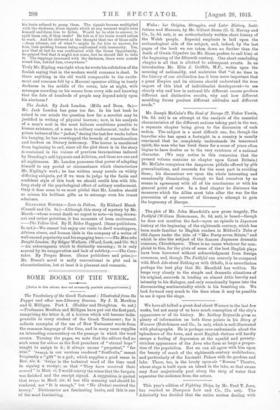SOME BOOKS OF THE WEEK.
[Notice in thio column does not necessarily preen& oularcquent review.] The Vocabulary of the Greek Testament : Illustrated from the Papyri and other non-Literary Sources. By J. H. Moulton and G. Milligan. Part I. (Hodder and Stoughton. es. net.) —Professors Moulton and Milligan have put out the first part, comprising the letter A, of a lexicon which will become indis- pensable to every student of the Greek Testament; for it collects examples of the use of New Testament words from the common language of the time, and in many cases supplies an interesting commentary on the passage in which the word occurs. Turning the pages, we note that the editors find no such sense for at‘ges as the first preachers of "eternal hope" sought to assign to it ; it always means "perpetual," "for ever." 'Arcepx41, in our versions rendered " firstfruits," meant frequently a "gift" to a god ; which supplies a good sense in Rev. sly. 4. 'Aviv., is the technical word of the time used in signing a receipt; so that "They have received their reward" in Matt. vi. 2 would convey the sense that the bargain was finished and the receipt signed. A suggestion is quoted that avixe, in Mark xiv. 41 has this meaning and should be rendered, not "It is enough," but "He (Judas) received the money." Dictionaries are fascinating books, and this is one of the most fascinating.


































 Previous page
Previous page